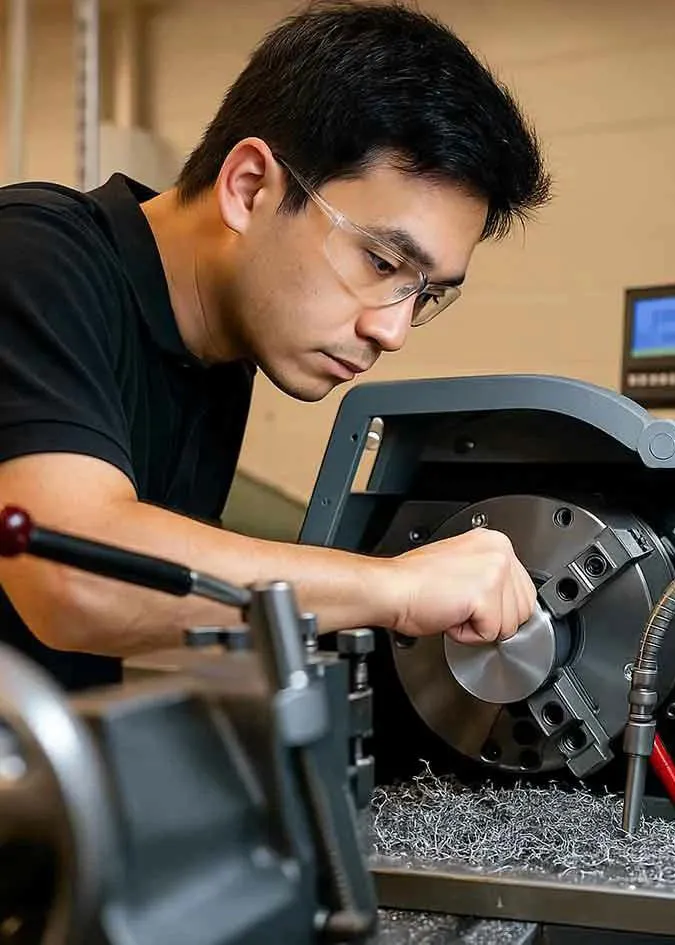CNC Manufacturing for Medical Devices
Robotika provides precision CNC machining services tailored to the medical devices sector’s high standards, with rapid prototype delivery in as fast as 7 days.
- 10+ years of medical-grade CNC machining & molding experience
- Achieve ±0.01 mm tolerances on every critical dimension
- Work with metals, polymers, and composites to create custom parts tailored to your project needs
- Ensure strict compliance with medical device regulations
- 24/7 engineering support
Start Manufacturing Your Medical Parts !
STEP | STP | IGS | IGES | PRT | SLDPRT | SAT | X_T
Max. file size: ≤15MB

Reliable Medical Parts CNC Machining Service Supplier from China
Robotika provides CNC manufacturing services for the medical device industry, offering high-precision prototyping and low- to medium-volume production of critical components. With strong machining capabilities and experience in handling complex geometries, we ensure accuracy, smooth surface quality, and reliable consistency. Our advantage lies in combining fast turnaround, DFM support, and the use of biocompatible metals and plastics, helping medical companies accelerate product development while meeting strict safety and performance standards.
In addition, Robotika provides value-added services including material consultation, finishing options tailored for sterilization and wear resistance, and comprehensive quality inspection using automated CMM systems. With over 10 years of experience and more than 100,000 parts produced annually, we proudly serve global medical device manufacturers, surgical instrument suppliers, and healthcare technology startups, delivering dependable CNC solutions from prototype through production.
What kind of medical device parts can we make?
Robotika manufactures a wide range of CNC-machined components for the medical device industry, including surgical instrument handles, orthopedic implants, dental device parts, diagnostic equipment housings, pump components, and endoscopic fittings. These parts are commonly produced from stainless steel for corrosion resistance and sterilization compatibility, titanium for lightweight strength and biocompatibility, aluminum alloys for structural and lightweight applications, and engineering plastics such as PEEK, PPSU, and medical-grade ABS for insulation, wear resistance, and repeated sterilization performance. All components are thoroughly verified using automated CMM inspection and visual checks, achieving tight tolerances as precise as ±0.01 mm.
- Surgical instrument handles
- Orthopedic implants
- Spinal fixation components
- Dental implant abutments
- Dental drill guides
- Endoscopic fittings
- Catheter components
- Pump housings
- Valve bodies
- Surgical scissors and forceps parts
- Bone saw guides
- Stent delivery system parts
- Prosthetic joints
- Needle holders
- Microscopic instrument housings
- Diagnostic device enclosures
- Lab automation brackets
- Imaging equipment components
- Biopsy tool parts
- Robotic surgery system brackets
- Sterile connectors
- Surgical fasteners
- Ventilator valve components
- Laparoscopic tool tips
Medical Device Parts CNC Machining Capabilities
Supported Materials
We specialize in machining medical-grade materials such as aluminum alloys (6061, 7075), titanium (Ti-6Al-4V), stainless steel (304, 316L), and advanced plastics like PEEK and PPSU, suitable for demanding medical device applications.
Machining Accuracy
We maintain standard tolerances within ±0.01mm, ensuring high precision for medical device components.
Maximum Machining Size
Our maximum machining size is 1000mm × 600mm × 500mm, accommodating a wide range of medical device parts.
Surface Finishing Options
We offer anodizing, polishing, bead blasting, powder coating, and other finishes to enhance durability and performance.
Delivery Time
Standard lead time is 5-10 days, with expedited services for urgent projects.
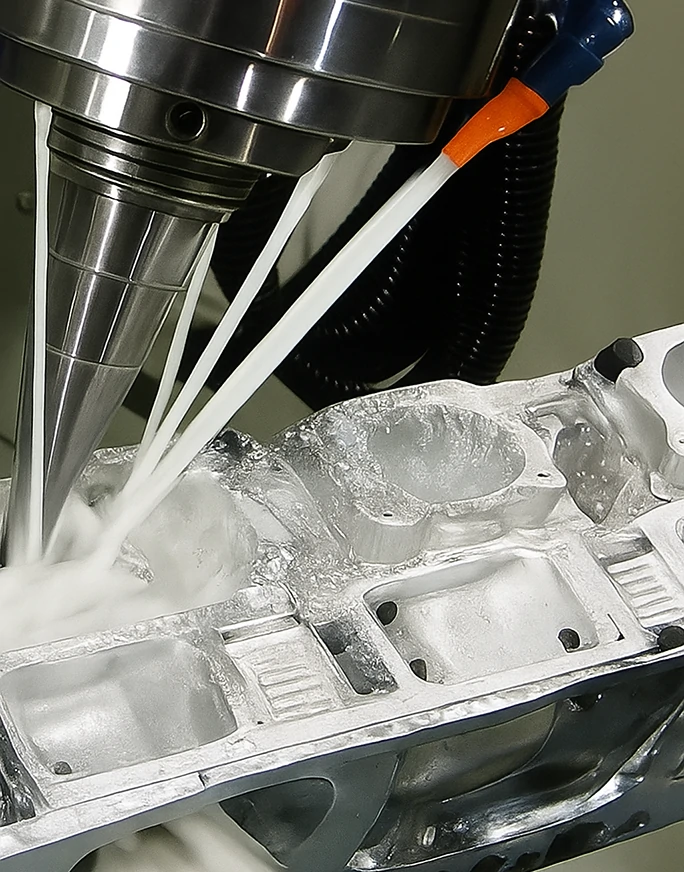
Experience the boundless possibilities of customization
Enhance your medical device components with advanced surface finishes and precision detailing. At Robotika, we customize each part to meet your exact specifications—including material selection, geometry, and coating—ensuring performance, reliability, and full compliance with medical device standards.
| Name | Tolerance Range |
|---|---|
| Standard Medical Device Parts | ±0.1 mm to ±0.2 mm |
| Precision Medical Device Parts | ±0.02 mm to ±0.1 mm |
| Complex Medical Device Parts | ±0.05 mm to ±0.2 mm |
- *Robotika accommodates part lengths of up to 48", depending on the process. For larger dimensions, please reach out to us for inquiries. The tolerances listed represent minimums under ideal conditions; however, looser tolerances may be necessary based on the process, material selection, or part geometry.
| Name | Description | Can Be Applied with | |
|---|---|---|---|

|
Anodizing | Enhances corrosion resistance, hardness, and surface gloss for aluminum alloy parts, commonly used for medical device housings and brackets. | Medical device housings, brackets, structural components |

|
Polishing | Enhances surface smoothness and appearance, commonly used for stainless steel and aluminum materials. | Stainless steel medical device parts, surgical tools, medical instrument surfaces |

|
Bead Blasting | Provides a uniform surface texture, improving durability and wear resistance, widely applied to both metal and plastic components. | Medical tools, surgical instruments, mechanical components |

|
Passivation | Increases corrosion resistance by removing free iron from the surface, commonly used for stainless steel parts in long-term use medical devices. | Stainless steel parts, medical tubing, contact parts in medical instruments |

|
Powder Coating | Provides a durable, corrosion-resistant surface, commonly used for metal or plastic parts to enhance durability and appearance. | Medical device housings, laboratory equipment housings, frames, and supports |

|
Nickel Plating | Enhances surface hardness, corrosion resistance, and wear resistance, commonly used for high-strength and wear-resistant medical components. | Titanium alloy or stainless steel parts, surgical tools, precision medical instrument components |

|
Electropolishing | Removes surface imperfections, enhancing the smoothness and corrosion resistance of metal parts, commonly used for stainless steel. | Medical tools, surgical instruments, medical device contact parts |

|
Chromate Conversion Coating | Provides additional corrosion protection, especially for aluminum alloys, widely used for medical devices that require high corrosion resistance. | Medical device housings, aluminum alloy parts, structural components |
- *We offer a range of additional finishing options, including chromic acid anodizing, cadmium plating, copper plating, titanium anodizing (blue anodizing), gold plating, silver plating, and more. If you require finishes for materials not mentioned here, please reach out to us directly.
Aluminum Alloys (6061, 7075)
Aluminum alloys (6061, 7075) stand out in CNC machining for medical devices, thanks to their exceptional machinability that allows for intricate, precise cuts—critical for crafting components with tight tolerances like surgical tool handles. Their strong corrosion resistance ensures they hold up against frequent sterilization using harsh chemicals or high-temperature autoclaving, a must in medical settings. Additionally, their lightweight nature reduces fatigue for medical staff using handheld instruments, while maintaining sufficient strength. For example, 6061 is widely used for surgical instrument handles due to its balanced strength and ease of shaping, while 7075, with higher tensile strength, finds application in implantable components like bone plates, where structural stability is paramount.
- Mill Lead Time: As fast as 3 days
- Finishes: Raw, anodized, bead blasted, polished

Stainless Steel (304, 316L, and 17-4PH)
Stainless steel grades including 304, 316L, and 17-4PH are staples in medical device CNC machining, owed to their robust strength that ensures durability even under repeated use—vital for surgical instruments like scalpels and forceps. Their superior corrosion resistance, especially 316L’s resistance to chloride solutions, makes them ideal for withstanding frequent cleaning and exposure to bodily fluids. Moreover, their excellent biocompatibility minimizes the risk of adverse reactions when in contact with human tissue, a key factor for both reusable tools and implantable parts. Common uses range from precision surgical scissors to components of diagnostic equipment like ultrasound probes, where reliability and sterility are non-negotiable.
- Mill Lead Time: As fast as 4 days
- Finishes: Raw, passivated, polished, bead blasted

Titanium Alloys
Titanium alloys, particularly Ti-6Al-4V, are highly sought-after for medical device CNC machining, boasting a remarkable strength-to-weight ratio that rivals steel but with significantly less mass—perfect for implants like hip and knee replacements, which need to support body weight without adding excessive bulk. Their exceptional corrosion resistance ensures they remain stable in the presence of bodily fluids, preventing degradation over decades of implantation. Additionally, their biocompatibility allows for osseointegration, where bone tissue bonds directly to the material, enhancing implant stability. These alloys are also used in high-precision surgical tools, where their lightness reduces hand fatigue for surgeons while maintaining the strength needed for delicate procedures.
- Mill Lead Time: As fast as 5 days
- Finishes: Raw, anodized, polished
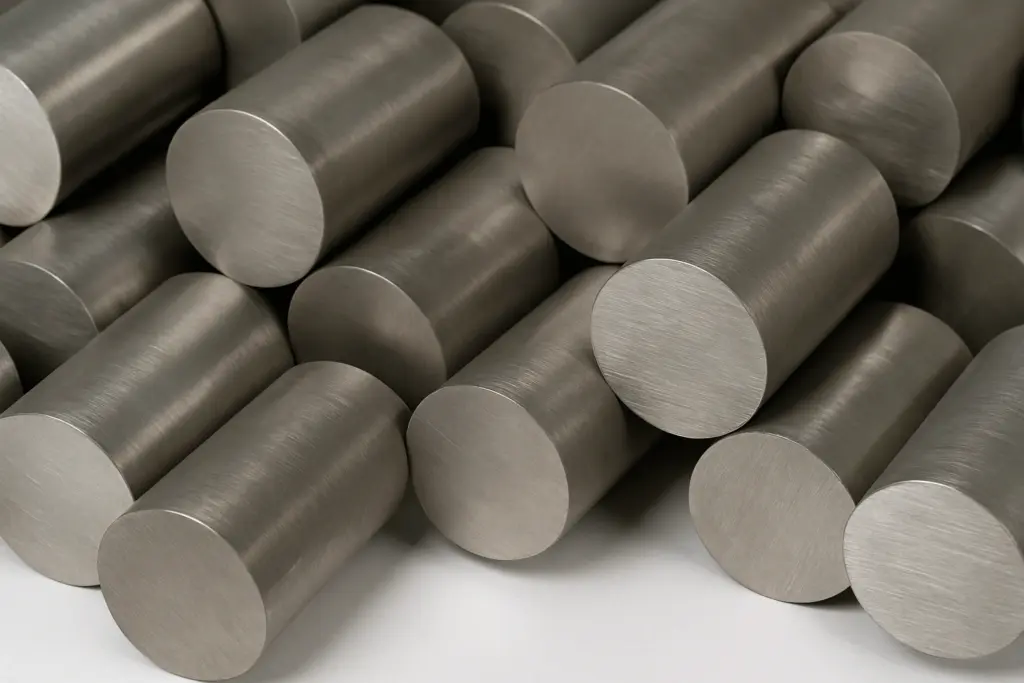
Cobalt-Chromium Alloys
Cobalt-chromium alloys are indispensable in medical implants, especially orthopedic devices, due to their exceptional wear resistance—a critical trait for joint replacements, where the alloy must withstand constant friction between moving parts like hip sockets and femoral heads. Their high tensile strength ensures they maintain structural integrity under the repeated stress of daily activities, from walking to climbing stairs. Additionally, these alloys exhibit excellent biocompatibility, rarely triggering immune responses, and their resistance to corrosion in bodily fluids ensures long-term stability. Beyond orthopedics, they’re used in dental implants and cardiovascular devices, where durability and compatibility are equally vital.
- Mill Lead Time: As fast as 5 days
- Finishes: Raw, polished, bead blasted

Copper Alloys
Copper alloys such as C110 and C360 are valued in medical devices for their outstanding electrical conductivity, making them ideal for components that transmit vital signals, like connectors in ECG monitors or pacemaker leads. Their excellent thermal conductivity also suits them for heat exchangers in medical equipment, such as laser therapy devices that need efficient heat dissipation to prevent overheating. C110, a high-purity copper alloy, is often used in electrical connectors for its minimal signal loss, while C360, a brass-copper blend, balances conductivity with better machinability, making it suitable for more complex parts like valve components in infusion pumps. These alloys also offer decent corrosion resistance, ensuring reliability in clinical environments.
- Mill Lead Time: As fast as 3 days
- Finishes: Raw, plated, polished
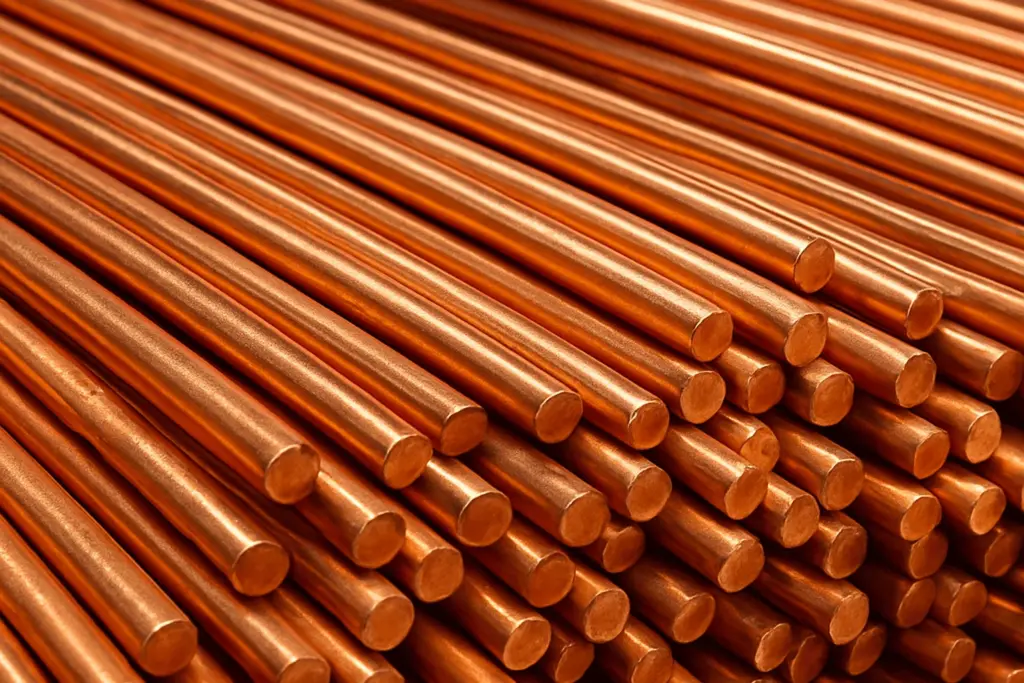
PEEK
PEEK is a top choice for CNC machining in medical devices, offering a rare combination of mechanical strength that rivals some metals—enabling its use in load-bearing spinal implants—and high-temperature resistance that withstands autoclave sterilization (up to 134°C), critical for reusable instruments. Its chemical stability ensures it resists degradation from bodily fluids, disinfectants, and pharmaceuticals, making it safe for long-term implantation. Additionally, PEEK’s radiolucency allows for clear imaging during X-rays or MRIs, a boon for monitoring implants. Beyond spinal hardware, it’s used in surgical instruments like forceps and retractors, where its strength and biocompatibility outperform traditional plastics.
- Mill Lead Time: Up to 5 days
- Color: Natural, black matte finish
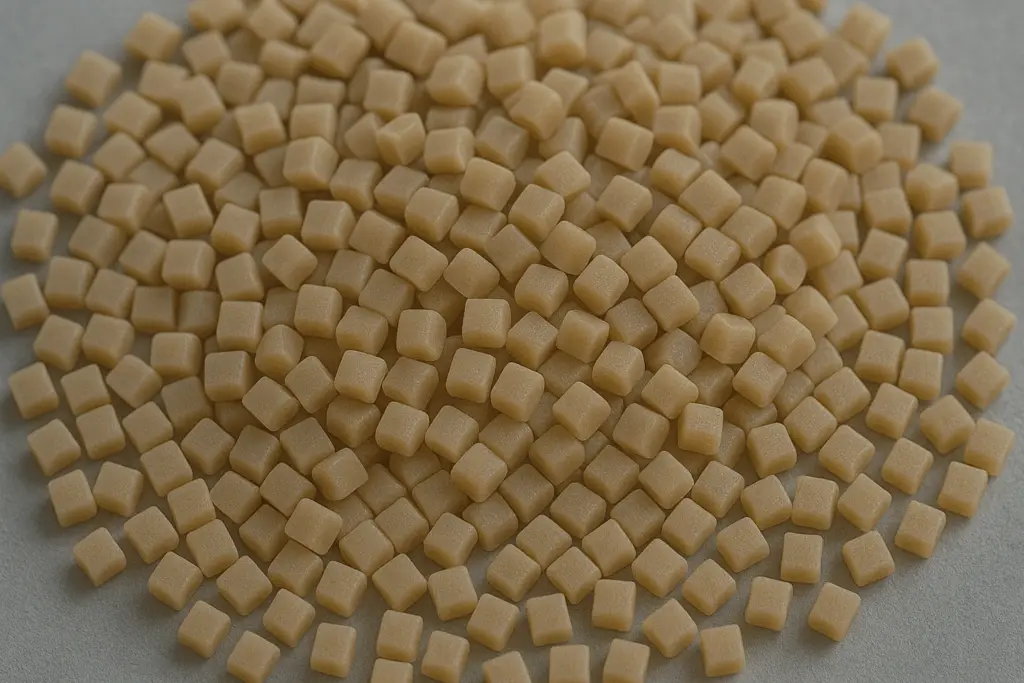
PTFE
PTFE is renowned in medical devices for its nearly universal chemical resistance, remaining inert to acids, bases, and organic solvents—ideal for seals and gaskets in drug delivery systems or dialysis machines, where contact with harsh chemicals is common. Its ultra-low friction coefficient ensures smooth movement in components like valve stems in infusion pumps, reducing wear and ensuring precise flow control. Additionally, PTFE is biocompatible and non-reactive, making it safe for use in catheters and implantable devices where it contacts bodily tissues. Its flexibility and ability to withstand extreme temperatures (from -200°C to 260°C) further expand its applications in medical equipment.
- Mill Lead Time: Up to 5 days
- Color: Natural, white finish
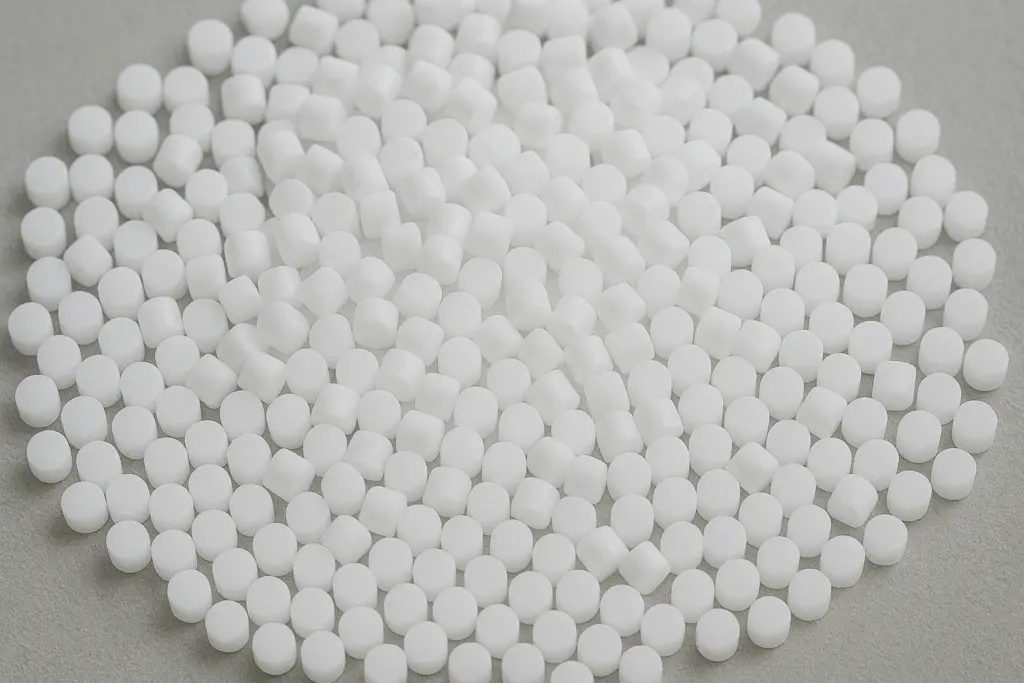
PPSU
PPSU is a high-performance plastic ideal for medical device CNC machining, boasting high tensile strength that allows it to withstand the rigors of repeated use in surgical instruments like hemostats. Its excellent temperature resistance (up to 180°C) ensures it holds shape during autoclave sterilization, a must for reusable tools. PPSU also exhibits strong chemical stability, resisting damage from disinfectants like ethanol and hydrogen peroxide, and is inherently resistant to bacterial growth—reducing infection risks. Beyond instruments, it’s used in housings for portable medical devices like nebulizers, where its durability and lightweight nature enhance usability.
- Mill Lead Time: Up to 5 days
- Color: Natural, black matte finish

Nylon
Nylon is widely used in medical devices for manufacturing mechanical components like bearings in hospital bed adjustment mechanisms, gears in surgical robots, and bushings in IV pole joints—all thanks to its excellent impact resistance that prevents breakage during accidental drops. Its inherent elasticity allows for slight deformation under stress, reducing wear on mating parts, while its durability ensures long service life in high-use equipment. Nylon also offers good chemical resistance to common cleaning agents and can be sterilized using ethylene oxide, making it suitable for components in sterile environments. Its affordability and ease of machining further solidify its role in medical device production.
- Mill Lead Time: As fast as 4 days
- Color: Natural, black finish
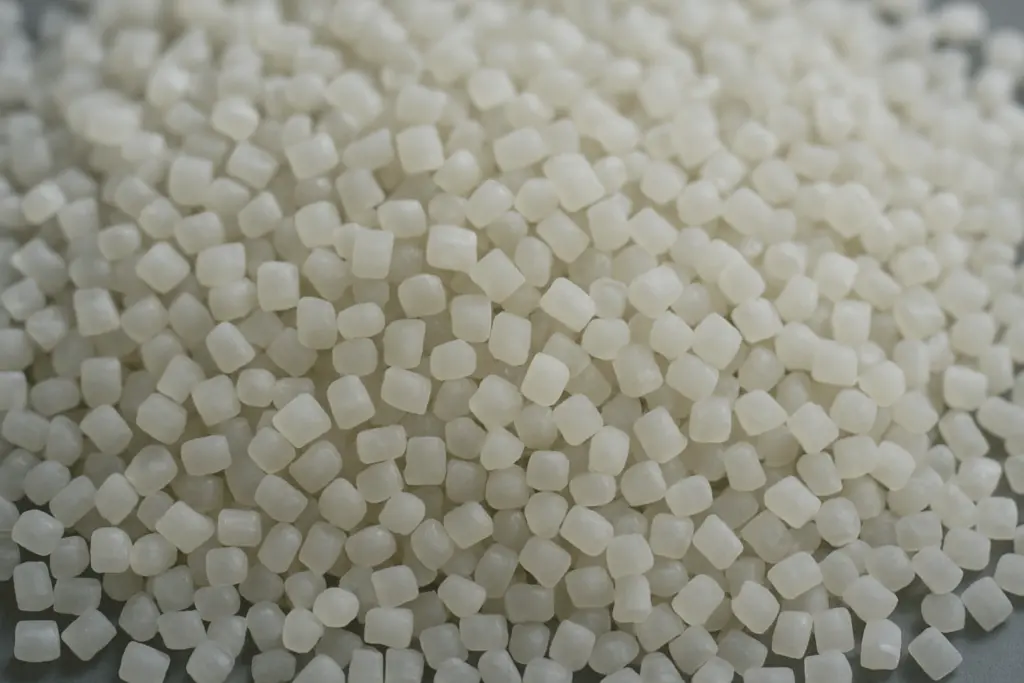
ABS
ABS is a go-to material for medical device enclosures and housings, valued for its lightweight nature that eases transport of portable devices like blood glucose monitors and defibrillators. Its high impact resistance protects internal electronics from damage during handling, while its smooth surface is easy to clean and disinfect—critical for preventing cross-contamination. ABS is also easy to machine into complex shapes, allowing for ergonomic designs in hand-held devices, and can be colored or textured to meet aesthetic and functional needs (e.g., non-slip grips). Its cost-effectiveness makes it ideal for large-scale production of diagnostic equipment casings and protective covers.
- Mill Lead Time: As fast as 3 days
- Color: Black, neutral matte finish
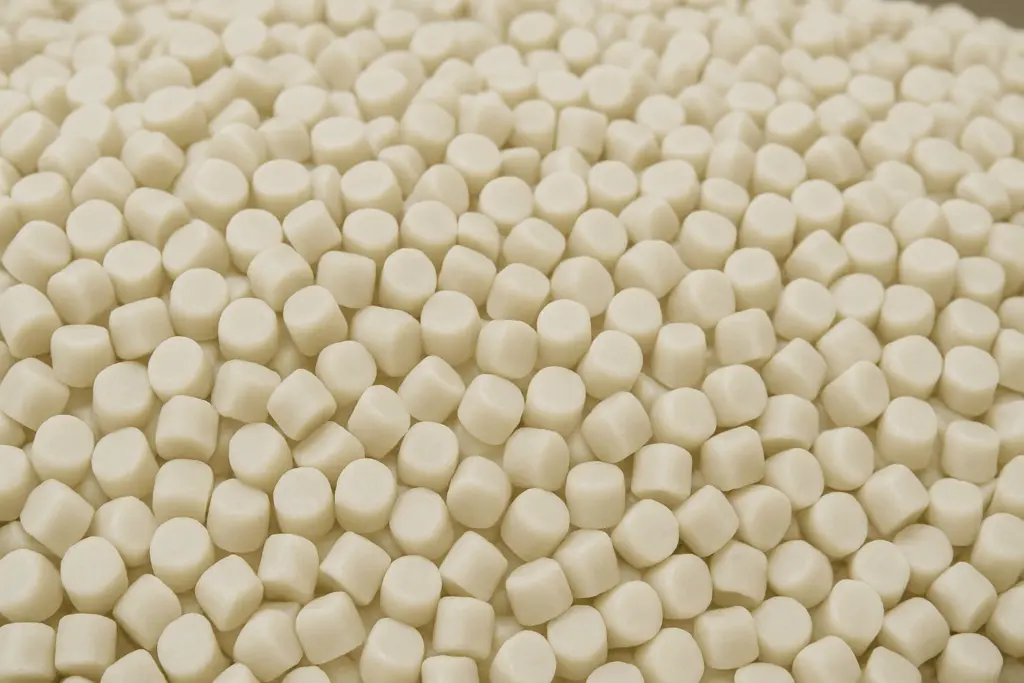
Polycarbonate
Polycarbonate is indispensable in medical devices for creating tough, transparent parts such as protective shields in operating rooms—where its high impact resistance prevents shattering from accidental impacts—and viewports in incubators, allowing medical personnel to monitor infants without opening the unit. Its clarity rivals glass, making it suitable for optical components in endoscopes and surgical microscopes, while its ability to withstand repeated sterilization (via autoclaving or chemical disinfection) ensures long-term usability. Polycarbonate is also used in safety goggles and face masks, where its combination of strength, transparency, and lightweight design enhances protection and comfort.
- Mill Lead Time: As fast as 4 days
- Color: Clear, translucent finish
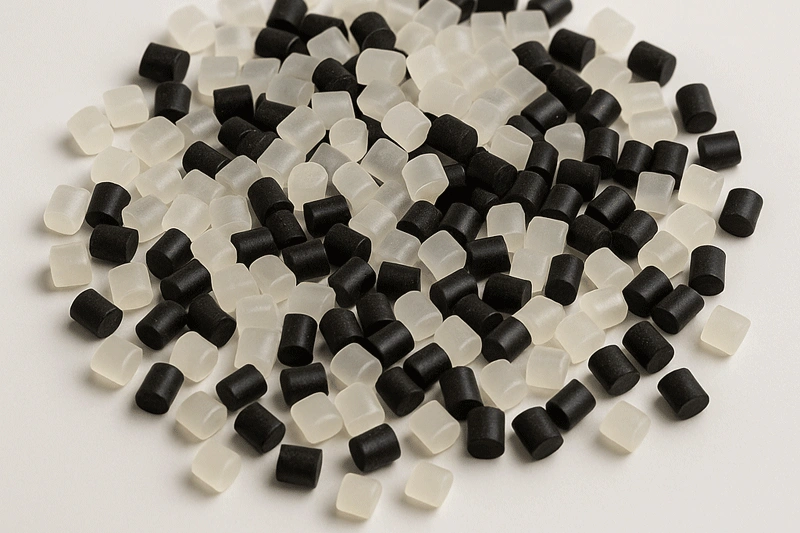
Carbon Fiber Reinforced Plastics
Carbon fiber composites are revolutionizing medical devices like prosthetics, where their ultra-lightweight nature (up to 50% lighter than steel) reduces strain on residual limbs, enhancing mobility for amputees. Their high strength-to-weight ratio ensures prosthetic legs can support body weight during activities like running, while their rigidity minimizes flexing, improving control. In medical robotics, these composites are used in surgical arm components, where their lightness allows for precise, energy-efficient movements, reducing surgeon fatigue during long procedures. Additionally, carbon fiber’s radiolucency makes it suitable for braces and supports used during imaging, as it doesn’t interfere with X-ray or MRI results.
- Mill Lead Time: Up to 7 days
- Color: Black, matte finish

Glass Fiber Reinforced Plastics
Glass fiber composites offer a cost-effective alternative to carbon fiber in medical devices, providing sufficient strength for structural parts like hospital stretcher frames—where they support patient weight while remaining lighter than steel, easing transport. Their durability ensures they withstand frequent use in busy healthcare settings, and their resistance to corrosion and chemicals makes them suitable for housings of laboratory equipment like centrifuges. Glass fiber composites are also used in orthopedic braces, where their rigidity provides support while being more affordable than carbon fiber, making them accessible for widespread use in rehabilitation.
- Mill Lead Time: Up to 6 days
- Color: Black, gray finish

Metal Matrix Composites
Metal matrix composites (MMCs) combine the strength of metals (like aluminum or titanium) with the lightweight benefits of ceramic or carbon fiber reinforcements, resulting in materials ideal for medical equipment parts. For example, MMCs are used in the arms of X-ray machines, where their high strength supports heavy imaging components while reducing overall weight, making the equipment easier to maneuver around patients. Their wear resistance suits them for moving parts in surgical tables, ensuring smooth adjustments over years of use, and their thermal conductivity helps dissipate heat in laser treatment devices. MMCs also offer good biocompatibility, expanding their use to implantable devices requiring both strength and lightness.
- Mill Lead Time: Up to 7 days
- Color: Natural, matte finish
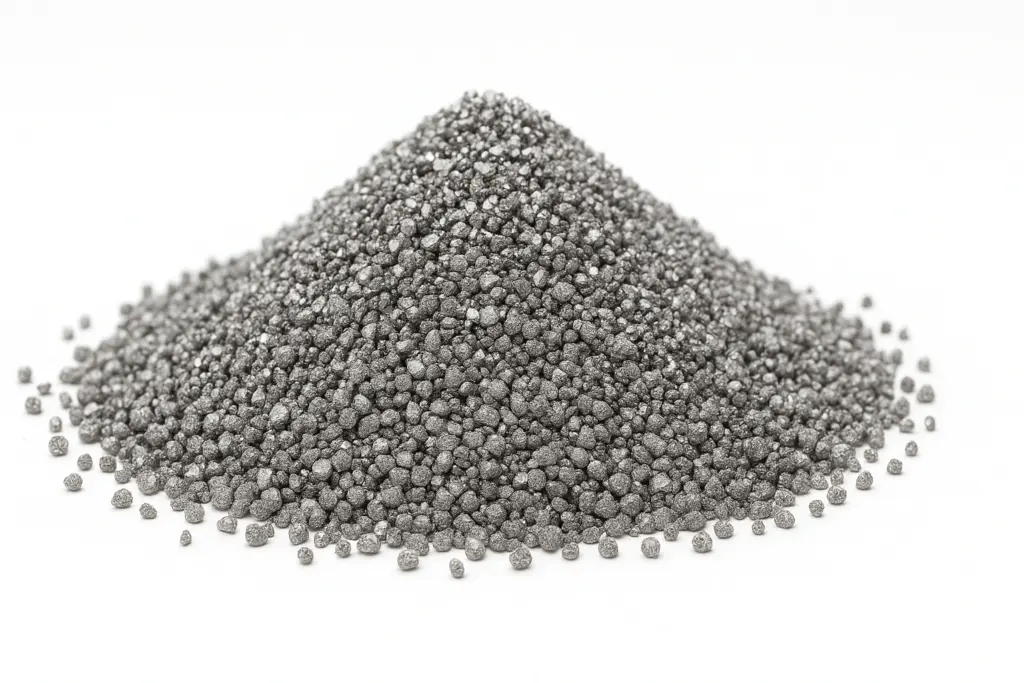
CNC Medical Parts Supplier FAQs
For prototypes, lead time is usually 3-5 days. For small production runs, it typically takes 7-10 days. Larger or more complex orders may take 2-3 weeks.
Yes, we specialize in machining medical-grade materials such as titanium, PEEK, stainless steel, and other biocompatible materials used in medical devices.
Yes, you can send us your 3D CAD file (STEP, IGES, or STL format), and we’ll provide a custom quote based on your material, quantity, and specific requirements.
Yes, we can provide Certificates of Conformance (CoC) and material traceability to meet industry standards and regulations for medical device manufacturing.
To begin, we need your 3D CAD file, material specifications, required quantities, surface finish preferences, and any delivery deadlines to provide an accurate quote.
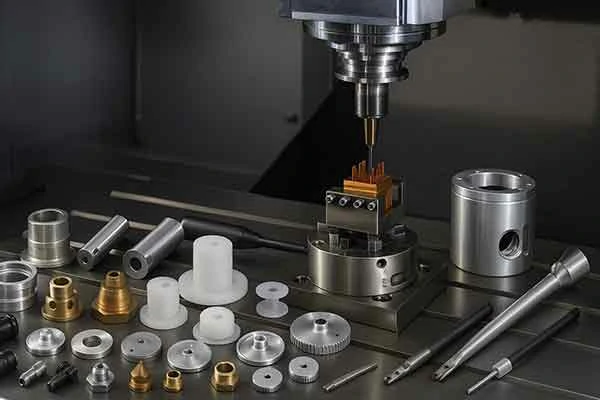

Start Your Medical Device Parts CNC Machining Project Now!
Contact us for free quote and expert advice today.
Your inquiry will be replied within 24 working hours, and we respect your privacy.
